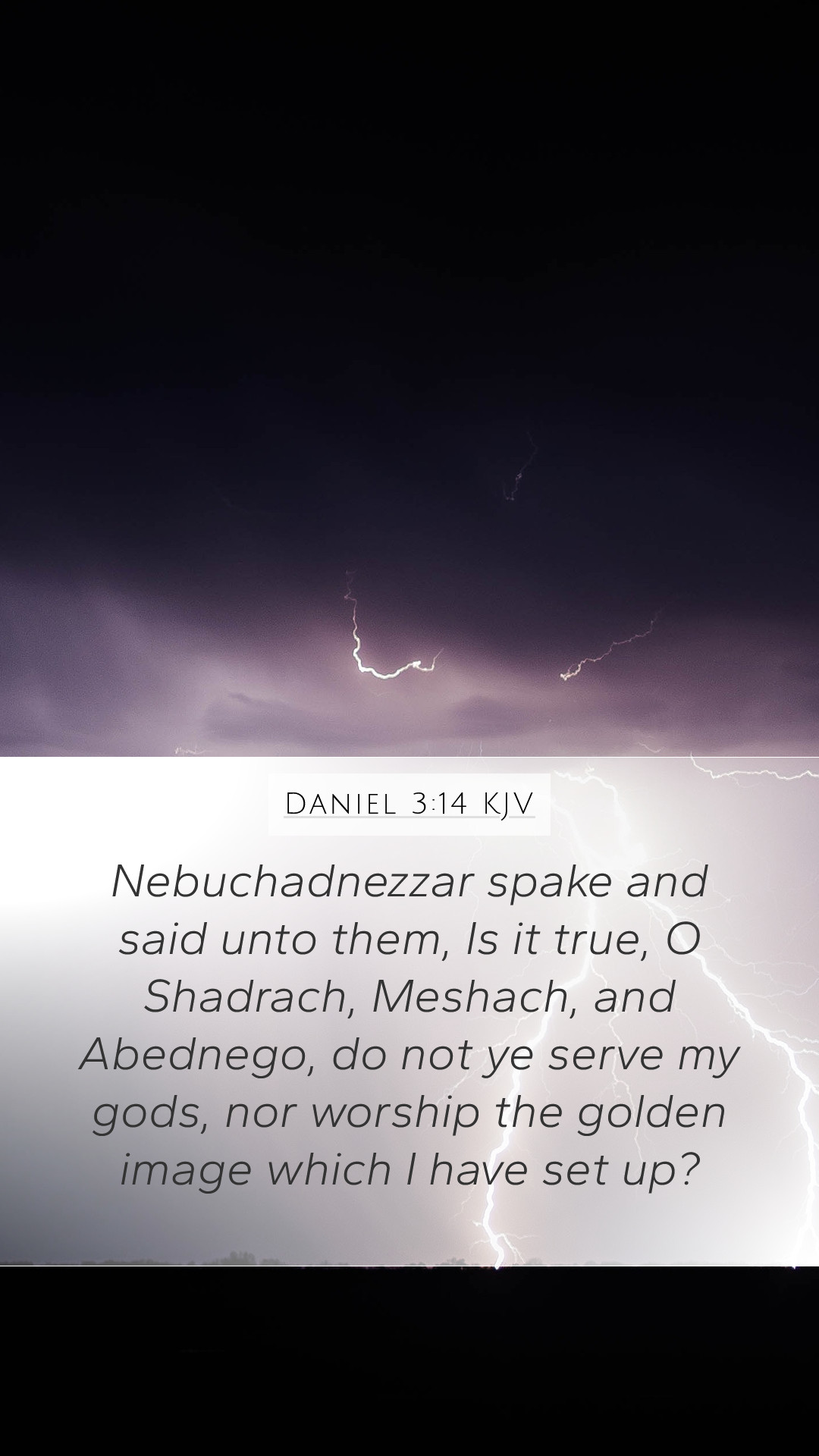Bible Verse Commentary on Daniel 3:14
In Daniel 3:14, King Nebuchadnezzar confronts Shadrach, Meshach, and Abednego, questioning their refusal to worship the golden image he has set up. This verse serves as a pivotal moment in the narrative, illustrating themes of faith, loyalty to God, and the consequences of standing against tyranny. This commentary draws insights from well-regarded public domain commentaries to deepen our understanding of this significant biblical passage.
Context and Historical Background
The Book of Daniel, set during the Babylonian exile of the Israelites, provides a historical backdrop of Jewish experiences under foreign rule. This particular narration emphasizes the trials faced by faithful Jews who refused to conform to idolatrous practices. In this context, Daniel 3:14 acts as a declaration of loyalty to God in refusal of Nebuchadnezzar's demands.
Verse Analysis
Daniel 3:14 states:
"Nebuchadnezzar said to them, 'Is it true, Shadrach, Meshach, and Abednego, that you do not serve my gods or worship the image of gold I have set up?'"
Meaning of the Confrontation
- Authority and Power: King Nebuchadnezzar represents earthly authority, exemplifying the pressures that regimes impose on individuals regarding allegiance and worship. His inquiry reflects a challenge to the faith of the three men.
- Testing Faith: This verse highlights a significant test of faith. The commands of earthly rulers can often conflict with divine instructions, leading to moments where believers must stand firm in their convictions.
- Idolatry vs. True Worship: The construction of a golden image serves as a powerful symbol of idolatry, a theme prevalent throughout the Scriptures. The refusal of Shadrach, Meshach, and Abednego to bow to the image underscores their commitment to the one true God as per the First Commandment.
Biblical Exegesis
To gain deeper insight, we analyze the implications of this confrontation:
- Faithfulness: The unwavering faith of the three men demonstrates their commitment to God amidst formidable oppression. This theme encourages believers in all eras to maintain their faith in challenging circumstances.
- Defiance of Tyranny: Shadrach, Meshach, and Abednego symbolize civil disobedience when faced with divine disobedience; their actions challenge the narrative that government orders must be followed unconditionally.
- Divine Sovereignty: The question posed by Nebuchadnezzar also opens a dialogue on God's sovereignty. It highlights that while earthly powers can command, the ultimate authority lies with God.
Commentary Insights
Insights from respected commentators enrich our understanding:
Matthew Henry
Henry emphasizes the boldness of the three men. Their answer to Nebuchadnezzar's challenge is expectedly yet forthrightly resolute. He highlights the moral fortitude required to withstand the king's pressure and points to a larger theological framework of reliance on God in the face of persecution.
Albert Barnes
Barnes focuses on the king's anger and the severity with which he approaches the disobedience of Shadrach, Meshach, and Abednego. He notes the nature of absolute authority and how it seeks to eliminate dissent, portraying the king not just as a ruler but as a representation of wrathful power against divine principles.
Adam Clarke
Clarke further elucidates the cultural implications of the golden image, explaining the societal pressures faced by the Jewish community at the time. He discusses the historical significance of idolatry and the impact on communal identity, as well as the importance of covenant fidelity even in the face of life-threatening consequences.
Application of Daniel 3:14
The ramifications of this passage extend beyond historical context into practical applications for modern readers:
- Standing Firm in Faith: Believers today are encouraged to emulate the steadfastness of Shadrach, Meshach, and Abednego when societal norms clash with biblical teachings. Their example serves as an ultimate challenge to live authentically in faith.
- Understanding Consequences: This scripture teaches the necessity of weighing the consequences of actions and decisions against one's faith and values; the importance of prioritizing one's relationship with God over societal acceptance.
- Encouragement in Trials: The narrative inspires those facing persecution or social pressure to remain resilient, encouraging a deeper understanding of God’s sovereignty and faithfulness during adversity.
Cross References
This verse correlates with several other scriptures, which enhance its meaning:
- Exodus 20:3-5: The First and Second Commandments regarding idolatry.
- Acts 5:29: "We must obey God rather than men," a call to prioritize divine authority over human dictates.
- Isaiah 43:2: A reminder of God's presence and protection when facing trials.
Conclusion
Daniel 3:14 serves not only as a moment of confrontation but also as an illustration of unwavering faith in the face of tyranny. For those seeking to understand scripture, this verse provides profound insights into the nature of loyalty, the significance of faith, and the ultimate authority of God over man. Through the lens of biblical commentaries and practical applications, we gain a rich understanding of worship, idolatry, and the courage required in the walk of faith.


